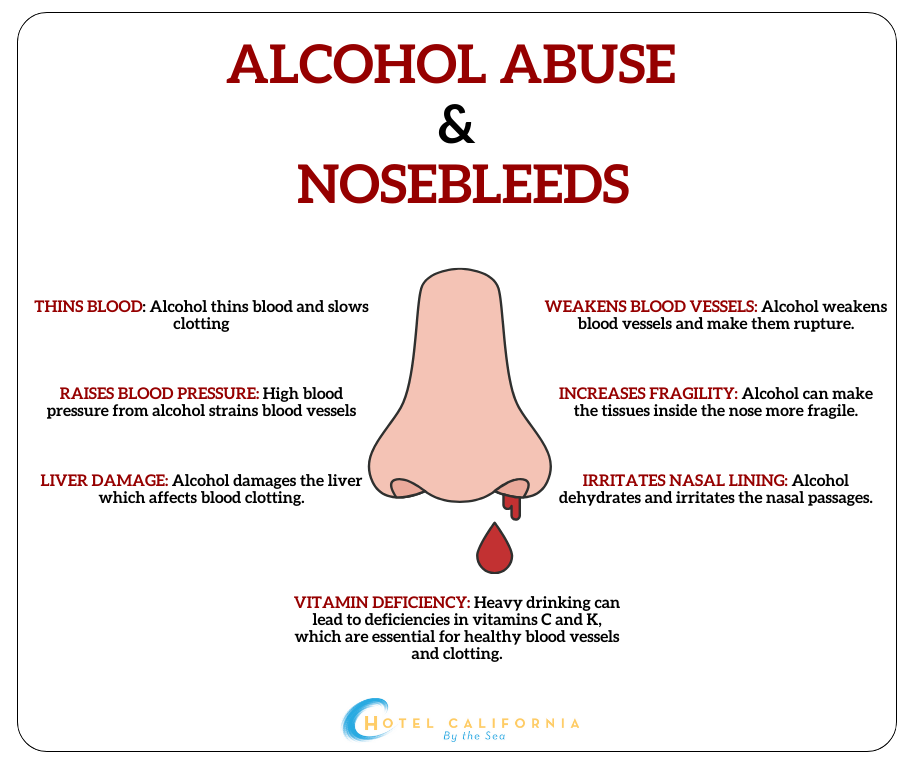Alcohol Abuse and Nosebleeds
Alcohol is the most widely abused substance in the United States. According to the National Institute on Alcohol Abuse and Alcoholism, an estimated 85.6% of people ages 18 and over have consumed alcohol at some point in their lives. Alcohol abuse can lead to a number of negative side effects, one of them being nosebleeds. Drinking alcohol doesn’t directly cause nosebleeds. However, research has found that frequent and heavy drinking patterns can significantly increase the risk of developing nosebleeds.

Research has found on average, about 6.3% of adults engage in some pattern of heavy drinking each month. This type of dangerous drinking can contribute to nocturnal nosebleeds or nosebleeds throughout the day. Epistaxis is the medical term for having a nosebleed. Nosebleeds are characterized by the loss of blood from tissue that lines the inside of your nose. Nosebleeds are actually quite common and about 60% of people will have at least one episode of a nosebleed in their lifetime. Can alcohol abuse cause nosebleeds?
What are nosebleeds?
- Anterior Nosebleed. An anterior nosebleed is bleeding that begins at the front of the nose from the lower part of the wall that separates the two sides of your nose. The capillaries and small blood vessels in this area are very fragile and can easily break causing bleeding.
- Posterior Nosebleed. A posterior nosebleed comes from deep inside the nasal septum which is the wall connecting the two sides of the nose. Bleeding from this part of the nose is caused by larger blood vessels in the back part of your nose near the throat. Although this type of nosebleed is less common, it can result in heavier bleeding and can sometimes end up in the back of your throat.
Factors that can cause nosebleeds
- A rapid change in humidity or climate
- Cold weather and dry air
- Allergies
- Chemical irritant exposure
- Certain types of medications such as blood thinners
- Nose tissue injury
- Recreational drugs
- Deviated septum
- Sinus infections
- Too much and frequent use of nasal sprays can cause a stuffy, runny or itchy nose
- Nasal tumors
- Bleeding disorders such as hemophilia or Von Willebrand disease
- High blood pressure
- Heavy alcohol use and alcohol abuse

The relationship between Alcohol Abuse and Nosebleeds
At first glance, there may be no distinguishing relationship between alcohol abuse and nosebleeds. However, when taking a closer look, the two factors do correlate and have a cause-and-effect relationship. Research has found that people who suffer frequently from nosebleeds also have patterns of more frequent alcohol use. Although alcohol use does not directly lead to nosebleeds, heavy alcohol consumption can increase risk factors that lead to nosebleeds.
There are a few factors that lead to nosebleeds that are impacted by excessive and heavy alcohol use. Nosebleeds that are caused by cardiovascular effects such as high blood pressure and hemostatic effects such as vasodilation are impacted by alcohol consumption.
Heavy drinking can interfere with blood platelets because alcohol is a natural blood thinner. Blood platelets are cells that help the blood in your body clot to keep you from bleeding out. When blood platelets are not functioning properly or if you don’t have enough of them, your body may not be able to clot the way it is supposed to. This results in poor blood clotting. When the blood does not clot, it becomes very thin making it difficult to stop bleeding once it starts.
Alcohol users who have other underlying conditions such as blood clotting disorders such as hemophilia or Von Willebrand disease can also increase a person’s risk for nosebleeds.
Vasodilation. Vasodilation is a natural response triggered by alcohol’s impact on the body. When alcohol enters the bloodstream, it impacts the muscle cells that line the blood vessels, causing them to relax and widen. These blood vessels also run through the nose. When this occurs, there is an increase in blood flow and dilation of the nasal blood vessels, which can make them more fragile and prone to injury, rupture, and excessive bleeding.
High blood pressure can also be a factor that causes nosebleeds. Heavy alcohol use is often associated with issues of high blood pressure. It raises blood pressure. Chronic high blood pressure can weaken blood vessel walls, which makes them more prone to rupture, easily leading to nosebleeds. The lining of the nose is covered in tissue called mucosa. The tissue also contains thousands of blood vessels. When these blood vessels are irritated or injured due to blood platelet interference, vasodilation or high blood pressure issues caused by alcohol abuse, it can easily lead to nose bleeding.
Check Your Insurance Coverage for FREE
Find out if your insurance covers addiction treatment in minutes. We accept most insurance!
Prevention of alcohol-induced nosebleeds
- Hydration. Alcohol causes dehydration and cause decreased activity of blood platelets which impacts your blood clotting ability. Hydration can also help your nose maintain proper moisture levels to keep your nasal passages from drying out or getting irritated.
- Proper nasal care. Use saline nasal spray and practice gentle nose care. A saline spray can help clean the nose. Avoid picking at or inside your nose and avoid blowing too forcefully.
- Use a humidifier at night to help maintain moisture levels in the air.
- Sneeze through an open mouth to avoid pressure in the nose.
- Limit the use of medications that thin out blood or that can increase bleeding such as aspirin and ibuprofen.
- Spread a water-soluble gel or ointment around the perimeter of the inside of the nostrils with a cotton swab.
- Quit smoking and quit drinking
How to stop a Nosebleed
- Sit upright with your body slightly leaned forward to keep the blood from running down your throat, which can cause nausea and vomiting
- Breathe through your mouth
- Use the thumb and index finger to pinch the soft part of your nose bridge to help stop the bleeding
- An ice pack at the bridge of the nose can also help shrink the blood vessels and help stop the bleeding
- Use a decongestant nasal spray on the nose
- Avoid straining, lifting anything heavy or harshly bowling your nose for several days post-nose bleed
Reach out to Hotel California by the Sea
We specialize in treating addiction and other co-occurring disorders, such as PTSD. Our Admissions specialists are available to walk you through the best options for treating your addiction.
Treatment for Alcohol Use Disorder
Alcohol use disorder can lead to many different symptoms including alcohol-induced nosebleeds. Though alcohol does not directly lead to nosebleeds, alcohol plays a crucial factor in other conditions that can significantly increase the risk of nosebleeds. In some cases, alcohol-induced nosebleeds can become very severe and need medical attention. Signs include difficulty breathing, pale skin, disorientation, chest pain or foul-smelling discharge from the nose. Heavy alcohol use can lead to a high risk of developing nosebleeds. Behavioral health treatment programs such as Hotel California by the Sea provide specialized programs for those suffering from alcohol use disorder.
We offer treatment at all levels of care including detox, residential, PHP and IOP. We utilized evidence-based treatment methods including CBT, DBT and EMDR therapy. The combination of medication-assisted treatments and behavioral therapies can help clients overcome their alcohol addiction. Hotel California by the Sea is dedicated to helping clients reach their recovery goals and achieve sobriety.
References:
https://pmc.ncbi.nlm.nih.gov/articles/PMC2541506
https://rehabrecoverycenters.com/can-alcohol-abuse-cause-nosebleeds/
https://my.clevelandclinic.org/health/diseases/13464-nosebleed-epistaxis
https://www.anormed.com/blog/why-does-my-nose-bleed-when-i-drink-alcohol/
